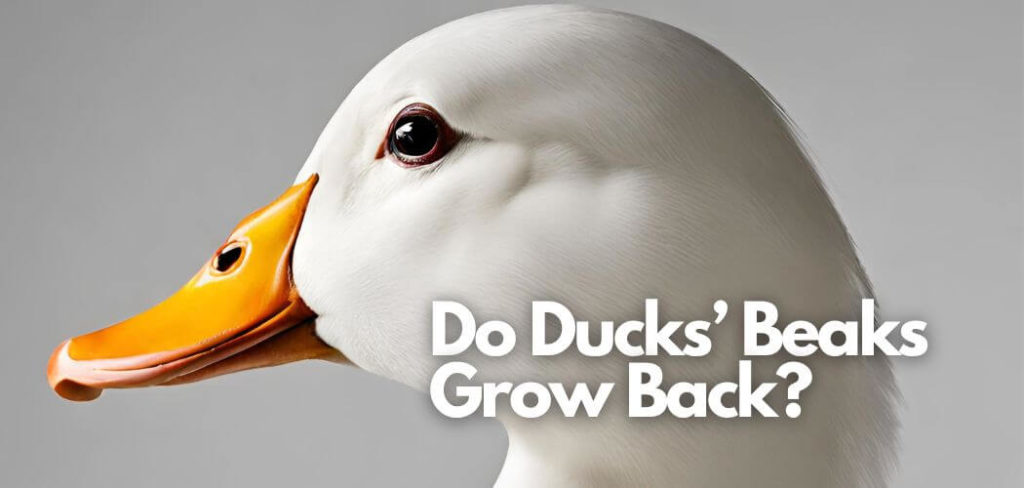Ducks are known for their unique and distinctive beaks, which they use for various purposes such as feeding, preening, and even communication.
However, accidents can happen, and a duck may lose part or all of its beak due to injury or illness.
This raises the question – do ducks’ beaks grow back?

Do ducks beaks grow back?
The answer is both yes and no. Ducks, like many other bird species, have a specialized tissue called the “bill tip organ” that allows their beaks to continuously grow and regenerate.
This means that if a duck loses the tip of its beak, it can regrow over time. However, if the damage is more severe and the entire beak is lost, it may not grow back fully or at all.
It’s important to note that the regrowth of a duck’s beak is a slow process and can take several weeks or even months.
During this time, the duck may have difficulty feeding and may require special care and attention to ensure its survival.
Additionally, if the beak does grow back, it may not be as strong or functional as the original beak, which could impact the duck’s ability to survive in the wild.
While ducks can regrow the tips of their beaks, the regrowth of a full beak is not always guaranteed.
If you have a duck with a damaged beak, it’s important to seek the help of a wildlife rehabilitator or veterinarian to ensure the duck receives the proper care and treatment it needs to recover.
How do ducks break their beaks?
Ducks can experience a variety of injuries that can damage their beaks. Some common causes of beak damage include fighting, pecking at hard surfaces, and accidents.
Ducks can also suffer from beak deformities due to genetic factors or poor nutrition.
Fighting is a common cause of beak damage in ducks, especially among males during the breeding season.
During fights, ducks may bite each other’s beaks, causing fractures or even complete loss of the beak.
Pecking at hard surfaces such as rocks or concrete can also cause beak damage, as the beak can become worn down or even break.
Can a duck survive with a broken beak?
Ducks use their beaks for various activities such as preening, feeding, and grooming. A broken beak can make these activities difficult, but can a duck survive with a broken beak?
The answer is yes, ducks can survive with a broken beak, but it depends on the severity of the break.
If the break is minor, the duck can still eat and drink normally, but may have difficulty with preening and grooming.
However, if the break is severe, the duck may have trouble eating and drinking, which can lead to malnourishment and dehydration.
If a duck has a broken beak, it is important to provide it with soft foods such as mashed vegetables, fruits, and grains. You can also offer the duck water in shallow containers to make drinking easier.
It is important to note that a broken beak can also affect a duck’s ability to defend itself from predators and communicate with other ducks.
Therefore, it is recommended to seek veterinary care if you notice a duck with a broken beak.
How Long Does Beak Regrowth Take?
The time it takes for a duck’s beak to regrow depends on the severity of the injury and the age of the duck. Younger ducks tend to regrow their beaks faster than older ducks.
On average, beak regrowth can take anywhere from several weeks to several months.
Ducks with minor injuries may see regrowth in just a few weeks, while more severe injuries can take several months to fully heal.
It is important to note that during the regrowth process, the duck may experience some discomfort and may require extra care and attention to ensure they can eat and drink properly.
In some cases, if the injury is too severe or the beak does not regrow properly, the duck may require assistance from a veterinarian or wildlife rehabilitator to ensure it can survive and thrive.
Overall, while beak regrowth can take some time, with proper care and attention, most ducks can fully recover and lead healthy, happy lives.
Duck beak regeneration process:
The regeneration process of a duck’s beak involves the growth of new tissue to replace the damaged or lost beak.
During the regeneration process, the damaged area of the beak will begin to form a scab.
Underneath the scab, new tissue will begin to grow, eventually forming a new beak. The process can take several weeks to several months, depending on the health of the duck.
It’s important to note that while the beak can regenerate, it may not grow back exactly as it was before.
The new beak may be shorter or have a different shape than the original beak. However, as long as the beak is functional, the duck should be able to eat and drink normally.
Studies have also shown that the time taken for a beak to regenerate varies based on the extent of the injury.
For instance, a partial beak amputation may take a shorter time to regenerate compared to a complete beak amputation.
Furthermore, researchers have discovered that the regeneration process is influenced by various factors such as age, nutrition, and genetics.
Younger ducks have been found to have a higher regenerative ability compared to older ducks.
Proper nutrition is also crucial for the regeneration process, as ducks require essential nutrients such as protein, vitamins, and minerals that help the beak to grow back.
What to feed a duck with a broken beak:
Feeding a duck with a broken beak requires special care to ensure the bird gets the nutrition it needs. Here are some guidelines:
Soft foods:
Offer soft and easily chewable foods. Ducks with broken beaks may have difficulty grasping or pecking at harder food items.
You can prepare foods like cooked rice, soaked bird pellets, or wetted waterfowl pellets which will be easy for the injured duck to it.
Chopped vegetables:
Chop leafy greens into small, manageable pieces. This can include spinach, kale, or lettuce.
Ensure the pieces are small enough for the duck to eat without requiring much pecking force.
You can moisten duck pellets:
Soften duck pellets by soaking them in water or a nutrient-rich liquid until they become easily chewable for your duck to pick and eat.
This helps the duck get the necessary nutrients without putting too much stress on the beak.
Provide your duck with protein-rich diet:
Include protein-rich foods like mealworms, earthworms, or finely chopped cooked eggs.
You should offer them to your duck in a clean deep bowl and ensure that the protein sources are appropriately sized for easy consumption.
Keep observing your duck:
Keep a close eye on the duck to monitor its eating habits and overall health.
If you notice any signs of distress or if the duck is struggling to eat, consider consulting a veterinarian with experience in avian care.
Provide clean water always:
Ducks need access to clean water for drinking and preening. Ensure the water is easily accessible and poured inside a deep bowl so the ducks can drink from it without causing further stress to the duck’s beak.
Seek professional advice:
If the duck’s condition worsens or if you are unsure about its dietary needs, consult a veterinarian with experience in treating birds.
Remember that individual ducks may have different preferences, so it might take some trial and error to determine what foods are most suitable for a duck with a broken beak.
Always prioritize the duck’s comfort and well-being in providing its diet.
How to prevent beak injuries:
Preventing beak injuries is crucial to ensure the health and well-being of your ducks.
Here are some tips to help you prevent damage or injuries to your duck’s beak:
Provide large spaces for your ducks:
Make sure your ducks have enough space to move around freely. Overcrowding can lead to aggressive behavior and fighting between ducks especially the males, which can result in beak injuries.
Provide a balanced diet:
A balanced diet is essential for your ducks’ overall health and can help prevent beak injuries by making the beak stronger and reliable.
Make sure your ducks are getting enough protein, vitamins, and minerals in their diet to keep beak healthy and strong.
Keep ducks surrounding clean:
A clean environment is essential to prevent infections that can lead to beak injuries. Make sure the bedding and water are clean and changed regularly.
Clear out all sharp objects:
Sharp objects such as wire or nails can cause serious beak injuries. Make sure to remove any sharp objects from the duck’s environment.
Closely examine each duck:
Regularly monitor your ducks for any signs of beak injuries. If you notice any injuries, isolate the affected duck and seek veterinary care immediately.
By following these simple steps, you can help prevent beak injuries in your ducks and ensure their overall health and well-being.
Final thoughts:
If you have a duck with a broken beak, you must seek professional help immediately even if is minor damage to the beak.
This is necessary to help the duck get the best treatment and recover fast.
